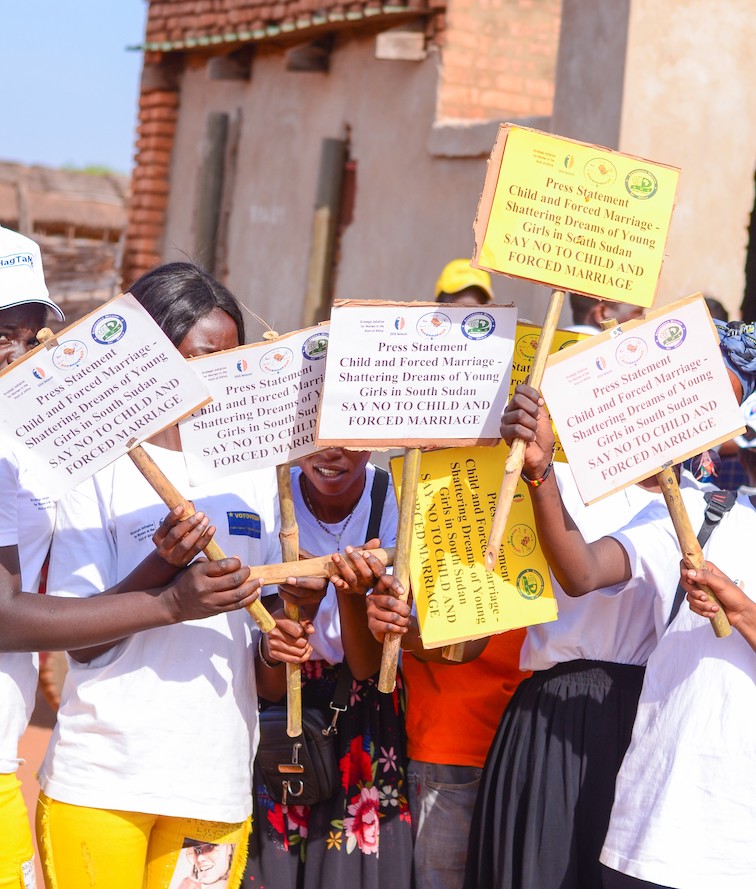SAY NO TO CHILD AND FORCED MARRIAGE

The following was read out during the events marking girls’ rights in South Sudan on the 15th of December 2022.
Child and forced marriage are both human rights violations and harmful practices that disproportionately affect women and girls globally, preventing them from enjoying their childhood and living fulfilling lives. This year’s National 16 Days of Activism theme in South Sudan, “Take Responsibility: Protect Women and Girls from GBV” is crucial in the context of child and forced marriage. During the South Sudan national launching event for 16 days activism in 2022, students from Promise College Secondary School recited a poem entitled, “Forced Marriage.” In this poem they shed light on girls’ rights to education, the dangers of child marriages, constitutional provisions on the illegality child marriage and finally cautioned parents to protect their girl children from forced marriage and instead invest in their education. They held debate on 6th of December on the topic “Education should be the prize Not Marriage” said students from Promise College Secondary School.
More than 10 girls are forced into marriage, every week in South Sudan and over 50% of all girls in the country are married before the age of 18, which leads to many of these girls dropping out of school.[1] Girls are sold into marriage as a result of several socio-economic factors including poverty, food insecurity and displacement, coupled with unequal power dynamics in patriarchal communities where men often control and make decisions on behalf of women and girls, including when they should get married and to whom they should get married. Many girls who are forced into early marriage lead a lifetime of suffering, which can manifest in domestic violence, including sexual assault and marital rape.
In a 2021 case study on child marriage in South Sudan, dowry was identified as one of the major contributing factors to the high prevalence of child and forced marriage. The same report notes that forced marriages happen early in girls’ lives, often soon after their first menstruation. Sadly, even when girls feel ready for marriage and have chosen the man they want to marry, they often face resistance from their families because the families can get a much higher dowry from a wealthier man – often these wealthier men are two or even three times the age of the young bride. In one particularly appalling case, a young woman married a man of her choosing and the had a child together, but the couple was forcibly separated by a relative who insisted that the young woman instead marry a man who is 44 years older than her.
Consent from the girls is disregarded, denying girls and women their right to choose a spouse in line with Article 16 of CEDAW and Article 6 of the Maputo Protocol.2 According to the African Union Protocol and CEDAW, no marriage shall take place without the free and full consent of both parties. This means that forced marriage is prohibited. Parents cannot compel their daughter to marry a man against her will and the minimum age of marriage shall be 18 years. Moreover, readiness for marriage shall not be concluded based on physical development or growth, but rather based on age.
As women’s rights activists and women leaders, we join the rest of the world to say no to child and forced marriage. We are saddened by the shattered dreams and devastating ramifications of this continued harmful practice. Child and forced marriage have led to the loss of many lives with girls dying while giving birth as a result of complications due to her age, others are beaten to death by parents or relatives for refusing to take part in these marriages. Additionally, relatives have solicited the support of local police to arrest and imprison girls who try to resist a marriage, as a means of scaring them into the forced marriage arrangement.
The South Sudanese Constitution states that South Sudan is founded on justice, equality, respect for human rights and fundamental freedoms. The Constitution goes ahead to define a child as boy or girl below the age of 18. However, equality and justice for women and girls are compromised. Sustainable Development Goal 3 notes that achieving equal justice and fairness for women and girls is a fundamental goal, this is important since South Sudan is a member state to UNSCR 1325.
We call upon the Government of South Sudan to take immediate action to end child and forced marriage. Specifically, we make the following recommendations:
- Put in place mechanisms to end child and forced marriage in line with the South Sudan Constitution.
- Reform the national security and policing systems and structures to reduce intercommunal violence and thereby reduce the number of people living in IDP camps.
- Support families, especially women, with economic empowerment initiatives to return to their lands where they can participate in agricultural activities, boosting their ability to support their livelihoods and the National economy.
- Ensure that the Constitution is fully implemented.
- Ensure compliance with and full domestication of the Convention on the Elimination of All Forms of Discrimination against Women (CEDAW).
- Fully ratify the Protocol to the African Charter on Human and Peoples’ Rights on the Rights of Women in Africa (Maputo Protocol).
- Fully implement and domesticate the Convention on the Rights of the Child (CRC).
- Build the capacity of local chiefs to recognize and take a stand against the traditional/customary laws, practices, and beliefs that deprive girls of their human rights, whilst encouraging them to warn their communities of the dangers of child and forced marriage.
- Conduct research on the long-term impact of child and forced marriage on girls, women and the development of the country.
[1] https://reliefweb.int/report/south-sudan/child-marriage-and-hunger-crisis-south-sudan-case-study
